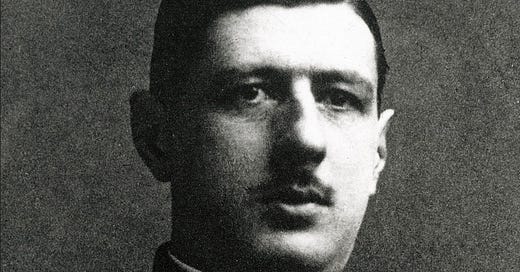“To be great is to sustain a great quarrel.”
—Hamlet
Uncertainty marks our era. So many denials of conventions, forecasts, doctrines, so many trials, losses, disappointments, so many outbursts too, shocks, surprises have shaken the established order. Weapons, which have just changed the world, do not fail to suffer from it first and mourn their lost ardor.
This melancholy of the military body outside periods of great effort is, without a doubt, nothing out of the ordinary. There is, in the contrast between the fictitious activity of the army in peacetime and its latent power, something disappointing that those concerned do not feel without pain: “So much unused strength…” says Psichari, “so much destiny and so much sterility!” All the more reason why such grief permeates the souls of soldiers in the years following battles. By suddenly relaxing, it seems that the spring breaks, not without sometimes giving off that deep, dull sound of complaint with which Vauvenargues and Vigny have lulled us.
Everything, moreover, in the atmosphere of the time seems to combine to trouble the conscience of professionals. After having suffered the cruelties of force, the masses react with passion. A sort of mysticism has spread everywhere which not only tends to curse war, but inclines to believe it to be obsolete, so much would one like it to be. A fervor which does not go without exorcisms: to ward off the evil genius, a great tumult of imprecations resounds throughout the world; to inspire the horror of sin, a thousand paintings apply themselves to representing its ravages by hiding what is found there of efficacy and grandeur. Of the battles, one wants to evoke only the blood, the tears, the tombs, no longer the glory with which the peoples consoled their pains. Even history is disfigured by some, under the pretext of erasing the war. The military order is attacked root and branch.
All the more so since such a movement, however excessive it may seem, can be explained only too well. In short, it shows the instinct for self-preservation of a weakened Europe, which senses all the risks of a new conflict. The spectacle of a sick man raising his fist to death cannot leave anyone indifferent. Moreover, how can this international order, to which temporarily calmed peoples aspire, be established without the help of a vast collective emotion? Now, one does not stir crowds except by elementary feelings, violent images, brutal invocations.
But, hope that we may, what reason have we for thinking that passion and self-interest, the root cause of armed conflict in men and in nations, will cease to operate; that someone willingly renounces what he has and what he desires, that men, finally, cease to be men? Do we consider today's equilibrium to be definitive, as long as the small want to grow, the strong to dominate, the old to subsist? How can borders and power be stabilized if evolution continues? Moreover, assuming that nations agree for a time to settle their relations by means of a sovereign code, will it be enough to say the law, if one cannot impose it? “Unarmed laws fall into contempt,” said Cardinal de Retz. International laws would be worthless without troops. Whatever direction the world takes, it will not do without weapons.
Without force, indeed, could one conceive of life? If one prevents birth, if one sterilizes minds, if one freezes souls, if one puts needs to sleep, then, without a doubt, force will disappear from an immobile world. Otherwise, nothing will prevent it from remaining indispensable. Recourse of thought, instrument of action, condition of movement, this midwife is necessary to bring progress to light. Bulwark of authority, rampart of thrones, battering ram of revolutions, we owe to it in turn order and liberty. Cradle of cities, scepter of empires, gravediggers of decadence, force makes the law to the people and rules their destiny.
In truth, the military spirit, the art of soldiers, their virtues are an integral part of the capital of humans. We see them incorporated in all phases of History to the point of serving as their expression. For, finally, could we understand Greece without Salamis, Rome without the legions, Christianity without the sword, Islam without the scimitar, the Revolution without Valmy, the Pact of Nations without the victory of France? And then, this abnegation of individuals for the benefit of the whole, this glorified suffering, — from which we draw the troops — respond by excellence to our aesthetic and moral concepts: the highest philosophical and religious doctrines have chosen no other ideal.
If therefore those who wield the French force were to become discouraged, there would not only be danger for the homeland but also a rupture of general harmony. If the power had escaped these wise men, what fools would seize it or what madmen? It is time for the military elite to regain awareness of its pre-eminent role, to concentrate on its object which is quite simply war, to raise its head and look towards the summits. To give an edge back to the sword, it is time that it restores the philosophy proper to its state. There it will find superior outlooks, pride of its destination, influence abroad, the only salary, — while waiting for glory — which can pay those who matter.




